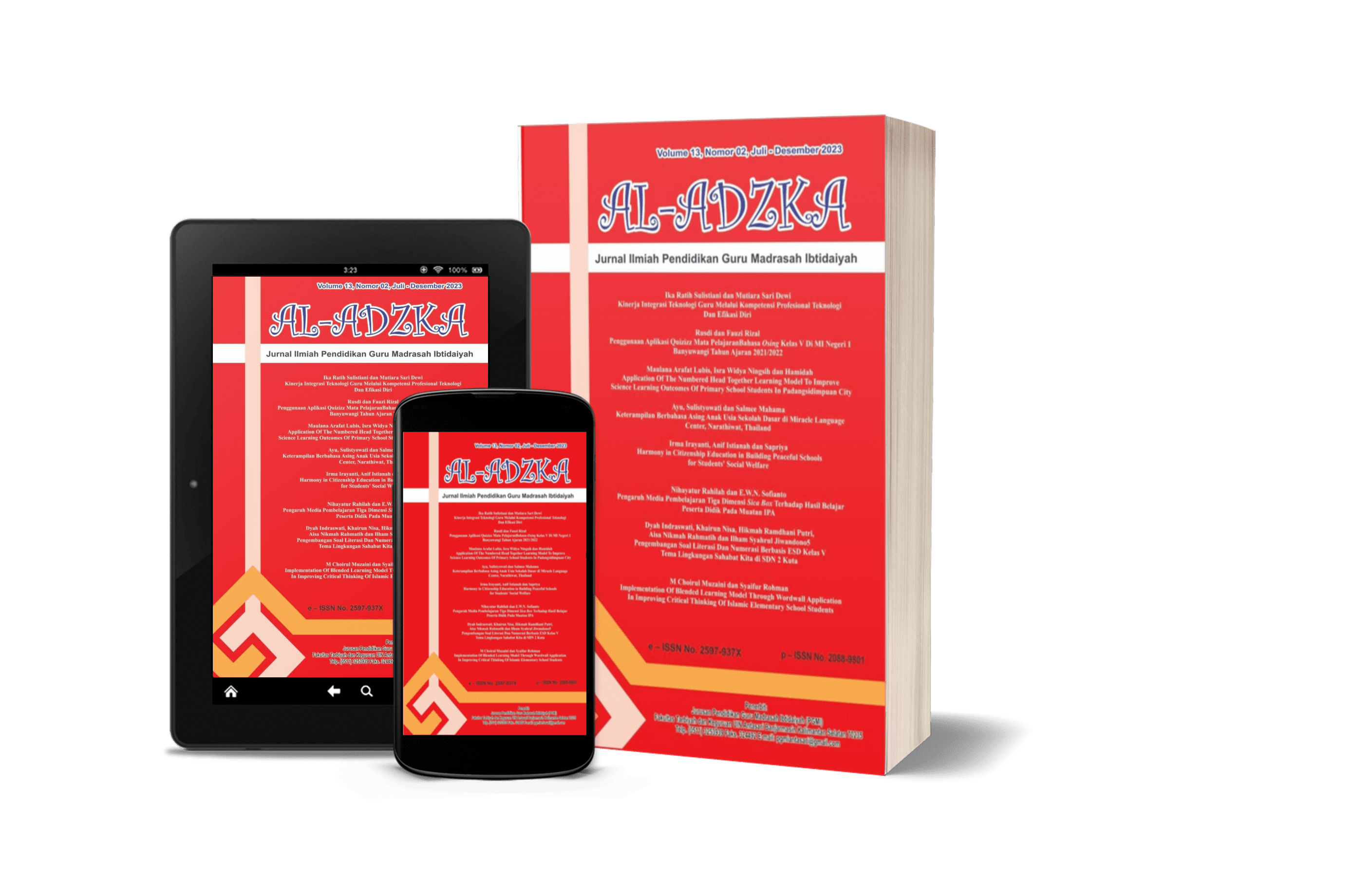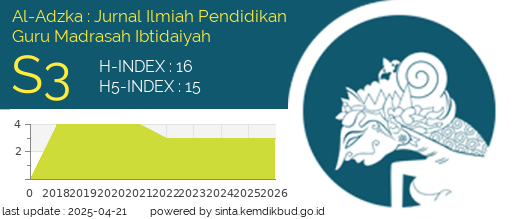Exploring Changes in Teachers' Views on Assessment Practices at Madrasah Ibtidaiyah
DOI:
https://doi.org/10.18592/aladzkapgmi.v15i1.15488Keywords:
Formative Assessment; Summative Assessment; Teacher Training; ABCD MethodAbstract
This study investigates alterations in educators' perspectives at Madrasah Ibtidaiyah Batu Town regarding the use of formative and summative evaluations in education following their participation in training. The study employs a research-oriented community service methodology utilizing the Asset-Based Community Development (ABCD) paradigm to optimize the inherent strengths and resources within the teaching community. Data was collected through pre-tests and post-tests completed by teachers regarding their understanding of the role of assessment in providing feedback, modifying learning plans, and monitoring student progress. The results of this study indicate that training with the ABCD method successfully changed the conceptual understanding of Batu City Elementary School teachers regarding pedagogical assessment (formative and summative) while strengthening the evidence that top-down training is effective in changing educators' perspectives on evaluation.References
Adinda, A. H., Siahaan, H. E., Raihani, I. F., Aprida, N., Fitri, N., & Suryanda, A. (2021). Summative Assessment and Formative Assessment of Online Learning. Report of Biological Education, 2(1), 1–10. https://doi.org/10.37150/rebion.v2i1.1024
Alfarisy Totalia, S., Imam Sujadi, Aniek Hindrayani, Susantiningrum, & Sigit Wahyudi. (2024). Persepsi Dan Pemaknaan Guru Tentang Standar Proses Dan Standar Penilaian Pendidikan. Jurnal Penelitian Kebijakan Pendidikan, 16(2). https://doi.org/10.24832/jpkp.v16i2.726
Chen, H., Xu, Y., Agba Tackie, E., & Ahakwa, I. (2024). Assessing the Impact of Asset-Based Community Development Approach on Rural Poverty Alleviation in Ghana: The Moderating Role of Government Policies. Sage Open, 14(1). https://doi.org/10.1177/21582440231226020
Confrey, J., & Shah, M. (2021). Examining instructional change at scale using data from diagnostic assessments built on learning trajectories. ZDM – Mathematics Education, 53(6), 1265–1283. https://doi.org/10.1007/s11858-021-01259-w
Darling-Hammond, L., Hyler, M., & Gardner, M. (2017). Effective Teacher Professional Development. https://doi.org/10.54300/122.311
Fan, T., Song, J., & Guan, Z. (2021). Integrating diagnostic assessment into curriculum: a theoretical framework and teaching practices. Language Testing in Asia, 11(1), 2. https://doi.org/10.1186/s40468-020-00117-y
Hariani, P. P., & Wastuti, S. N. Y. (2020). Pemanfaatan E-Learning Pada Pembelajaran Jarak Jauh di Masa Pandemi Covid-19. Biblio Couns : Jurnal Kajian Konseling Dan Pendidikan, 3(1), 41–49. https://doi.org/10.30596/bibliocouns.v3i2.4656
Kennedy, A. (2022). Climate justice and teacher professional learning … we owe it to our young people. Professional Development in Education, 48(1), 1–4. https://doi.org/10.1080/19415257.2021.2008126
Koka, R., Jurāne-Brēmane, A., & Koķe, T. (2017). Formative Assessment in Higher Education: From Theory to Practice. European Journal of Social Sciences Education and Research, 9(1), 28. https://doi.org/10.26417/ejser.v9i1.p28-34
Kraft, M. A., & Christian, A. (2022). Can Teacher Evaluation Systems Produce High-Quality Feedback? An Administrator Training Field Experiment. American Educational Research Journal, 59(3), 500–537. https://doi.org/10.3102/00028312211024603
Kusumah, S. N., Yusritawati, S., Nabilah, I., Rahayu, A. S., & Sulastri, I. S. (2024). Persepsi Guru Matematika terhadap Implementasi Kurikulum 2013 dalam Pembelajaran Matematika di SMP. Indo-MathEdu Intellectuals Journal, 5(1), 139–148. https://doi.org/http://doi.org/10.54373/imeij.v5i1.548
Lewu, E. G. Y. (2024). Tahapan pembelajaran ilmu pengetahuan sosial berdiferensiasi berbasis Asset Based Community Development (ABCD). FOUNDASIA, 15(1), 10–17. https://doi.org/10.21831/foundasia.v15i1.70964
Maclure, L. (2023). Augmentations to the asset-based community development model to target power systems. Community Development, 54(1), 4–17. https://doi.org/10.1080/15575330.2021.2021964
McKnight, J., & Block, P. (2010). The abundant community: Awakening the power of families and neighborhoods. In The abundant community: Awakening the power of families and neighborhoods. (pp. xiv, 173–xiv, 173). Berrett-Koehler Publishers.
Misnawati, M., Junari, J., Teibang, D., Ilham, I., & Luthfiyah, L. (2025). Evaluasi Hasil Asesmen Melalui Pemberian Umpan Balik dalam Tes Formatif sebagai Tolak Ukur Hasil Belajar Siswa. JIIP - Jurnal Ilmiah Ilmu Pendidikan, 8(2), 2236–2242. https://doi.org/10.54371/jiip.v8i2.6836
Oktaviana, D., Barizi, A., & Yaqin, M. Z. N. (2022). The Challenges of The Society 5.0 Era: The Evaluation of Learning in Primary Education. Al-Adzka: Jurnal Ilmiah Pendidikan Guru Madrasah Ibtidaiyah, 12(1), 10. https://doi.org/10.18592/aladzkapgmi.v12i1.5831
Omodan, T. C. (2023). Analysis of Asset-Based Community Development to Transform Rural Schools in South Africa. Interdisciplinary Journal of Rural and Community Studies, 5, 13–21. https://doi.org/10.38140/ijrcs-2023.vol5.02
Opfer, V. D., & Pedder, D. (2011). Conceptualizing Teacher Professional Learning. Review of Educational Research, 81(3), 376–407. https://doi.org/10.3102/0034654311413609
Rivan Marup, Caswita Caswita, & Husni Mubarok. (2023). Pengaruh Kompetensi Guru Terhadap Prestasi Belajar Siswa Di MTs. Negeri 3 Kota Tasikmalaya. Jurnal Nakula : Pusat Ilmu Pendidikan, Bahasa Dan Ilmu Sosial, 1(5), 57–65. https://doi.org/10.61132/nakula.v1i5.184
Sadler, D. R. (1989). Formative assessment and the design of instructional systems. Instructional Science, 18(2), 119–144. https://doi.org/10.1007/BF00117714
Suttrisno, S., Yulia, N. M., & Fithriyah, D. N. (2022). Mengembangkan Kompetensi Guru Dalam Melaksanakan Evaluasi Pembelajaran Di Era Merdeka Belajar. ZAHRA: Research and Tought Elementary School of Islam Journal, 3(1), 52–60. https://doi.org/10.37812/zahra.v3i1.409
Svensäter, G., & Rohlin, M. (2023). Assessment model blending formative and summative assessments using the SOLO taxonomy. European Journal of Dental Education, 27(1), 149–157. https://doi.org/10.1111/eje.12787
Wu, J., & Yu, X. (2025). The influence of formative assessment on academic performance: exploring the role of teachers’ emotional support. Frontiers in Psychology, 16. https://doi.org/10.3389/fpsyg.2025.1567615
Yan, Z., Wang, X., Boud, D., & Lao, H. (2023). The effect of self-assessment on academic performance and the role of explicitness: a meta-analysis. Assessment & Evaluation in Higher Education, 48(1), 1–15. https://doi.org/10.1080/02602938.2021.2012644
Yustitia, V., Rachmadtullah, R., Azmy, B., & Susiloningsih, W. (2021). Peningkatan Kompetensi Guru Sdn Margorejo I Melalui Workshop Evaluasi Pembelajaran Berbasis Hots. BERNAS: Jurnal Pengabdian Kepada Masyarakat, 2(1), 351–357. https://doi.org/10.31949/jb.v2i1.725
Downloads
Published
How to Cite
Issue
Section
License
Copyright (c) 2025 Waluyo Satrio Adji, Muhammad Nadir, Ibanez Sheila Anggi Damayanti

This work is licensed under a Creative Commons Attribution 4.0 International License.
Authors who publish with this journal agree to the following terms:
- Authors retain copyright and grant the journal right of first publication with the work simultaneously licensed under a Creative Commons Attribution 4.0 International that allows others to share the work with an acknowledgement of the work's authorship and initial publication in this journal.
- Authors are able to enter into separate, additional contractual arrangements for the non-exclusive distribution of the journal's published version of the work (e.g., post it to an institutional repository or publish it in a book), with an acknowledgement of its initial publication in this journal.
- Authors are permitted and encouraged to post their work online (e.g., in institutional repositories or on their website) prior to and during the submission process, as it can lead to productive exchanges, as well as earlier and greater citation of published work.












